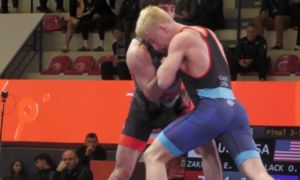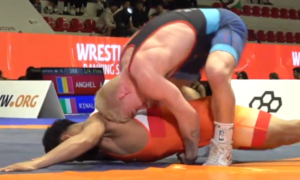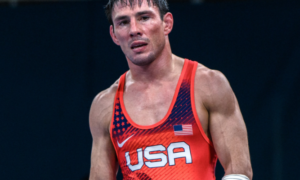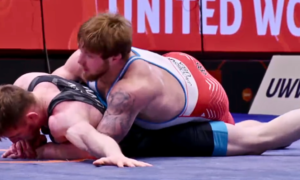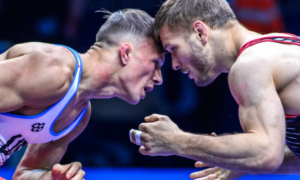Alston Nutter (66 kg, NMU-OTS) is one of the top full-time Greco-Roman prospects in the US. It’s really that simple. Before he went off to Northern Michigan to finish high school, Nutter enjoyed significant success at the age-group level that included wins at the Wisconsin Greco-Roman state championships and Northern Plains along with runner-up performances at both the UWW Cadet World Team Trials and the Cadet Fargo Nationals (2015). Last summer, the teen was unable to compete due to an injury. Then the next thing you knew, he was in Marquette getting ready for a trip across the Atlantic. Nutter wrestled in Sweden during the fall of 2016, going 3-2 on that tour, and he was off and running.
It has been a busy year for the kid from Fennimore and the level of competition he faced steadily rose as the months went by. So did the training. That’s why entering the 2017 Fargo Junior Nationals last weekend, Nutter was naturally considered a favorite to take the title in his 138 lbs weight class. It didn’t happen. Up 11-7 against the extremely-talented Mason Phillips (WA) in the finals, Nutter went for a front headlock throw that he went too far back on, allowing Phillips to seize the moment as well as the coveted “stop sign.”
Given Nutter’s status as one of the Greco program’s most prolific young competitors, we wanted to get his reaction regarding not only his performance, but also the differences he encountered hopping into a domestic event filled with gifted but inexperienced opponents. Officiating is a bullet point, as well. There’s still a hint of frustration evident in some of his words but for the most part, Nutter is ready to move past Fargo as he looks forward to another year of progression at NMU.
Alston Nutter — 66 kg, NMU-OTS
5PM: In the context of US Greco-Roman, you graduated, in a way. You moved ‘up’ to international competition to go along with a few domestic events. You’re at Northern and have been overseas. So what was your motivation for competing at Fargo this year?
Alston Nutter: Well, I never won it before so it was like, You know what? I’ve been training all year, so let’s go out and throw a couple kids around and win this. I’m still in the age division and it’s a super-fun tournament to compete in. It was more of a personal thing, to go and win it because I never have. That was the motivation behind wrestling at Fargo this year and plus, I didn’t make a World Team.
5PM: Coming out of the training environment at Northern, which is obviously Rob Hermann, Andy Bisek, Alex Sancho, Kendrick Sanders, so on and so forth, you had to have been working with a high level of confidence. Was your attitude something like, “I’m going to win this thing, and probably going away”?
AN: Oh yeah, I was thinking, I train with the best guys right now in the USA and I’m used to wrestling 20-year-olds and some college graduates. Now I get to wrestle kids my own age. So yeah, I was super confident going into it because I’m used to wrestling men, not kids my own age, so I figured I should be able to bypass them. But yes, I was super confident going into Fargo, which NMU definitely prepared me for.
5PM: Your opponent in the finals, Mason Phillips, he’s a great wrestler and actually someone who does know very well how to wrestle Greco. But there were other matches you had that likely now felt weird — trying to pummel in, kids backing out, some disengagement, stuff you’re not used to anymore, right?
AN: Yeah, well that’s a big thing. If I get an underhook and I’m trying to jack guys up, instead of them wrestling with me they push their hips way back and start running back. Whereas as a true Greco-Roman wrestler, you’re trained to not be defensive and instead wrestle through every position. You don’t pick and choose, you wrestle all the time. Sometimes these kids didn’t do that. I’d try to set something up and it’s just awkward. It was exactly like Max (Nowry) said, styles clashing.
5PM: How did you feel being able to get off your offensive attacks against lesser-experienced opponents? Your game has changed a lot since the last time you were at Fargo. Did you have to adjust your approach in order to score when you noticed them starting to disengage a little bit?
Alston Nutter: Well, yeah, in that situation you try to use their fleeing against them, and then start my offense, but maybe hit it in a little bit of a different way, not so much the same exact technical way you would against a guy who is experienced in Greco. Just finding ways scrambling around, finding your offense. But you have to adjust in there because of their fleeing and them just using their inexperience with positions you usually don’t see in Greco.
5PM: You got a taste of what international officiating is like this year. Refs overseas are notorious for being much more strict when it comes to handing out passives. What did you notice about the officiating compared to the experience you gained earlier this year in Europe?
AN: It’s almost like these refs are trying to take folkstyle and switch them over to Greco rules. So it’s like, it is kind of the same pace as folkstyle and trying to switch it over. But folkstyle and Greco are completely different. There is not always going to be an attack leading to a score in Greco, sometimes with two good guys there’s going to be a passive. And I don’t think the refs are very good at recognizing passivity or they’re not good at calling it. They’re not on it. With folkstyle and Greco, it is almost like there are two different objectives in who’s stalling, but they’re not good at calling passives. In that sense, the person who is stalling will get the passive called on the other guy, not the guy who is actually being passive. They need to work on calling the actual passive guy and not the guy who is working. They’re just not good at it, that’s all I can say.
5PM: Did it play with your mind at all, or did you not worry about it because you figured if you had to score, you always could?
AN: I didn’t really think about the passivity calls too much, we were just on that topic and there are other things I didn’t like about the refs I could go into. But no, it never really crossed my mind. I know I’m going to score, so in my mind I’m not worried about passivity. I didn’t really worry about that aspect as much.
5PM: Another part of the piece with Max and Spenser had to with pressure and expectations. Someone like yourself, who is a committed full-time Greco athlete, and Britton Holmes, Peyton Omania, your opponents in Fargo all knew who you guys were, their coaches knew, they heard the stories. Did you feel any pressure in Fargo because of this, being a “true Greco guy”?
Alston Nutter: I didn’t really feel pressure. I mean, I would usually tell myself, You know what, you do come from full-time Greco so you should win this because it’s what you train for and you should take no losses because of that. I guess I did put my expectations way higher because of this tournament. So a little bit, yeah.
5PM: How do you see your final a few days later after being able to breathe it out a little? Do you look at it like, Ah, I lost, it happens, it’s time to move on? Or do you look at it as, There are still elements of my game that need some sharpening up?
AN: Yes, that’s exactly it. I’m taking this as a learning experience. A little bit of match-management in situations. I didn’t really need to go for that fricking toss, I could’ve just stepped out of bounds, but instead I threw myself to my back and it was really stupid. So from an analytical standpoint, I’m just like, I found another weak point I need to work on. It is not so much about technique, it’s all about timing when I really do need those types of moves and in that situation, I really didn’t.
Another thing I look back at is kind of the officiating. There are a couple of things that I didn’t agree with in the match in regards to the scoring. Nothing against the refs — I never make excuses. But some of the things the ref called in the match make it really hard for me not to comment on any of that. It’s not that the refs made a bad call, it’s that they don’t know what to call. For instance, on one of the techniques that I hit, almost like a sag-arm-throw, they started with his movements and his points, when it was me who really hit the move and he fell to his back, but they called it against me. I mean, just the experience of the refs, they should know how to score something like that. It’s like some of the techniques they had never seen before and maybe they just need to get into the sport more. They need to learn.
5PM: Well you make a good point if only because the competence of the referees is vital to the development of the sport. The athletes need to learn how each match is governed. It’s a chain effect. That is essentially what you’re talking about, right? Because it seems to be a pervasive issue at times, specifically at the age-group level.
AN: Yeah, that is exactly what I’m saying. Let’s say I go overseas and the same exact situation happens, they’re going to score it completely different. Let’s say I hit the same exact move, had the same exact match with foreign refs, it’s going to be called I don’t even know how differently. My opinion would be a lot different. But it comes down to the American wrestling refs learning whose points are whose and what is a passive, what’s this, what’s that, and as the style changes, the wrestling changes, too, and I don’t think the refs understand that.
5PM: Now it’s over. It’s in the memory bank, it’s history, so we move forward. You’re entering your second full year at NMU. When are you returning to campus and what are you looking at as your first competition once the fall arrives?
AN: Well, we’re due back August 21st for meetings, to get going and learn when everything is going to be. And I’m pretty sure at either the end of September or the beginning of October there is a tournament in Panama for Seniors (the Eduardo Campbell Cup — Ed.). I’m pretty sure that is going to be my first tournament.
5PM: Can we expect a full slate of competition this time around? There were a couple of events you missed your first year. Are you in for the Schultz, the Farrell, and everything in between?
Alston Nutter: Yes, I’ll be 18, last year I was 17 and there was a lot of paperwork I didn’t realize I needed to have. Now I’m 18 and I can actually compete with all that stuff. I turn 18 on September 25th and without all that paperwork, I can start doing all of those tournaments and I will.
Follow Alston Nutter on Twitter and Instagram to keep up with his career and competitive schedule.
SUBSCRIBE TO THE FIVE POINT MOVE PODCAST
iTunes | Stitcher | Spreaker | Google Play Music | RSS



